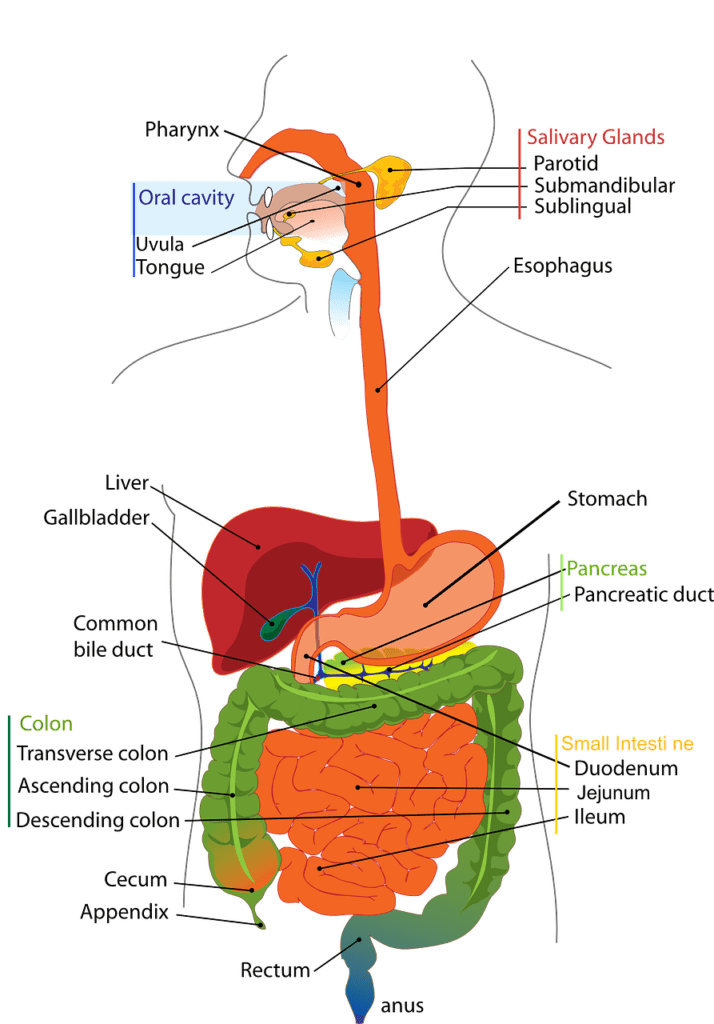Your gut health is extremely important for your overall health. In fact, the gut microbiome – the community of bacteria that live in your digestive system – is crucial for your health. The gut microbiome has a huge impact on your immune system, metabolism, and even mood. That’s why it’s so important to take steps to improve and strengthen your gut health. In this article, we will look at how important your gut is to your overall health, how to tell if your gut is healthy, and what you can do to improve your gut health.
How Important is your Gut Health?
Your gastrointestinal system is how you take in and process nutrients, but did you know it also functions as a communications center and helps in disease prevention? The gastrointestinal (GI) tract, simply called the digestive tract, is the part of the body that handles food intake and output from start to finish. This means the entire system that includes your mouth, esophagus, stomach, small intestine, pancreas, liver, gallbladder, colon, and rectum. So while these body parts are the digestive tract, “gut health” refers to more than just the health of these body parts. Gut health also includes the bacteria living inside of us, or the microbiome.

You see, without the bacterial microbiome inside our guts, we could not fully process the foods we eat. The microbiome is mostly in the large intestine where researchers have found a person’s body can contain trillions of bacterial cells. For reference, astronomers estimate there are about 200 billion stars in the entire Milky Way galaxy.
While we have a lot of diverse bacteria living inside of us, not all of the bacteria are “good.” By good, we mean beneficial, since these “bad” bacteria are just doing what they need to survive. The good bacteria feed on the fiber in our diets, whereas the bad bacteria feed on things like simple sugars and processed foods. So while you might think that you just need to get rid of the “bad” bacteria, we need both the good and bad. What matters is how balanced they are in your gut.
An unhealthy balance of gut bacteria has already been linked to digestive diseases such as Irritable Bowel Syndrome (IBS) and Crohn’s Disease.
How Your Gut Health Affects the Rest of You
Your gut microbiome, both good and bad, have more widespread effects on your health than just your digestion. The gut microbiome also controls how your immune system works. Better gut health means your immune system can respond better to infections. That’s not all though. There is also an increasing amount of research showing that bad gut health can be the cause of problems such as autoimmune disorders.
Your gut, or specifically the microbiome, has also been found to have control over your nervous system. This gut-brain axis is a bidirectional information highway between your gut microbiome and your nervous system. While more research still needs to be done, we know now that gut bacteria can use signals to cause cravings for the food products they need. More bad bacteria can mean you get more cravings for the sugary and processed foods they feed on. Furthermore, bad gut health is now linked to issues such as autism, anxiety, and depression.
Of course, the main thing most people now associate good versus bad gut health with is weight loss. A good healthy gut microbiome can help with weight loss and maintaining proper weight. Imbalanced gut health inversely can cause unnecessary weight gain leading to obesity.
Can you be born with good gut health?
For years people with bad physical health and weight problems used the “born this way” excuse. While there are certainly cases where someone may have a genetic predisposition towards weight gain, in most cases it comes down to diet. But what about the gut microbiome? Are some people born with bad microbiomes?
When you are born, the only bacteria you have in you have come from your mother. While the research is still not conclusive, some say you get exposed to your first microbes inside the womb. Other researchers say that a baby is first exposed to microbes when passing through the birth canal. This is why in recent years, C-sections have been looked at as a partial cause of some health issues.
Regardless of the birth method, a baby will get some of the first digestive microbes from its mother’s breast milk. This is part of the reason why breastfeeding is seen as important. After this, your diet will play the biggest part in how your gut microbiome grows. The more sugary and processed foods you eat, the more you feed the bad bacteria. The more the bad bacteria grow the more imbalanced your gut microbiome will become.
So while you are “born” with it to a certain degree, it does not set anything in stone. If you are experiencing bad gut health or bad digestive issues, your lifestyle and diet are the main culprits.
How You Can Tell Your Gut Health Is Bad
So while I’ve already listed just some of the health problems an unhealthy gut can cause, there are also many other signs that your gut health is bad.
Stomach discomfort
This of course should be one of the most obvious first signs of an unhealthy gut. The occasional upset stomach can just be from eating something that wasn’t agreeable with you. But if you are frequently experiencing symptoms such as stomach pain, gas, and bloating, then you could be experiencing Irritable Bowel Syndrome which would be the result of an imbalanced gut microbiome.
Unexpected Weight Changes
If you are carrying around extra weight that you can’t seem to lose no matter how much you diet and exercise, bad gut health could be the reason. As I said before, an imbalanced gut microbiome has been linked with obesity. So if you find yourself struggling to lose weight, it might be time to take a closer look at your gut health.
Skin Problems
Acne, eczema, psoriasis, and other skin conditions have also been linked with bad gut health. The inflammation caused by an imbalanced microbiome can manifest itself in many ways, including through the skin. If you are struggling with chronic skin problems, it might be time to talk to your doctor about your gut health.
Unexplained Fatigue or Sluggishness
If you are always tired and have no energy, bad gut health could be the cause. The digestive issues that come with an unhealthy gut can take a lot of energy to deal with. This can lead to fatigue and make it hard to focus or concentrate on anything else. The digestive issues that come with an unhealthy gut can make it hard to get a good night’s sleep. While a lack of sleep will certainly contribute to your fatigue, if you are having regular nights of restless sleep it could be due to your gut.
Unexplained Mood Disorders
As I’ve already pointed out, there is a strong link between gut health and mental health. An imbalanced microbiome has been linked with depression, anxiety, and other mood disorders. While still not proven, a research study indicated that bad gut health can even cause migraines via the gut-brain axis. If you are struggling with mental health issues, it might be time to take a look at how unhealthy your gut may be.
Food Intolerances or Allergies
If you find yourself constantly bloated and in pain after eating certain foods, it could be because you have developed a food intolerance or allergy. When your gut is unhealthy, it can’t properly break down the food you are eating. This can lead to inflammation and all sorts of other digestive issues. While this may not be the case for all food allergies, research has shown the gut microbiome is involved with lactose intolerance.
Bowel Irregularity
If you are constantly dealing with diarrhea or constipation, it could be a sign of an unhealthy gut. When your microbiome is imbalanced, it can lead to all sorts of digestive issues, including bowel irregularity. While everyone is different, having regular but not too often bowel movements is a good indication your gut is healthy. Pooping several times a day or only once every few days is a good indication of bad gut health. Additionally, the Bristol quality of your BMs is also a good indication of the quality of your gut microbiome.
Simple Ways You Can Improve Your Gut Health
While many factors contribute to gut health, there are also many things you can do to improve your gut health. These can range from simple to complicated depending on how easy they are to implement in your life or how difficult you find it to change your habits.
Lower Your Stress Level
One of the best things you can do for your gut health is to lower your stress level. When you are stressed, your body goes into fight-or-flight mode and starts to produce cortisol. This hormone has been shown to hurt gut health. It can lead to inflammation, disrupt the microbiome, and even change the way your gut produces enzymes. There are many different ways you can lower your stress level, so find what works best for you.
Get More Sleep
A good night’s sleep is important for gut health. When you are sleep-deprived, your body produces more cortisol. So sleep deprivation has the same effect as higher stress levels. Fortunately, fixing your sleep issues are easier can be easier than some other options.
Drink More Water
Water is essential for gut health. It helps to keep things moving along in your digestive system and flushes out toxins. One research study found that people who drank more water had fewer of a certain bacteria that can cause gastrointestinal infections. Staying hydrated helps your overall health as well so just make it a point to drink plenty of water.

Eat More Of and a Variety of Fruits and Vegetables
Fruits and vegetables are packed with nutrients that are good for your gut health. They contain fiber, which helps to keep things moving along in your digestive system, as well as prebiotics. Prebiotics are a type of fiber that feeds the good bacteria in your gut. So make sure to eat plenty of fruits and vegetables of all different colors to get the most benefit for your gut health.

Eat Whole Grains
Whole grains are another good source of fiber. They also contain vitamins, minerals, and antioxidants that are good for your gut health. One research study found that whole grains can help to reduce inflammation in the gut. So make sure to include plenty of whole grains in your diet if you want to improve your gut health.
Eat Fermented Foods
Fermented foods are a great way to introduce good bacteria into your gut. These foods are packed with probiotics, which are live bacteria that can help improve your gut health. Some examples of fermented foods include yogurt, kefir, sauerkraut, and kimchi. Fermented foods can also lower food cravings for sugar and carbohydrates. So before you go looking to pop a few probiotic pills, just grab some yogurt first.
Eat More Polyphenols
Polyphenols are a type of antioxidant. Polyphenols are not digested by us very well but the good bacteria in our guts love them. More food for the good bacteria means more of them. Polyphenols can be found in a variety of foods, but start with red wine, green tea, dark chocolate, almonds, and blueberries. I like to take it a step further and go for green tea with added probiotics!
Limit Intake of Sugar, Artificial Sweeteners, and Processed Foods
Sugar, artificial sweeteners, and processed foods all help feed the bad guys in your gut. So start limiting your intake of these. I know you might be using diet drinks as a way to get around too much sugar, but even artificial sweeteners are bad for your health. And let’s face it, but it can be hard to avoid processed foods, especially in the United States. The best option is to slowly reduce how much of these you are consuming until you have them almost entirely out of your diet.
Take Antibiotics Only If Necessary
Antibiotics are designed to kill bacteria but don’t discriminate between good and bad bacteria. So when you take them, you are killing off some of the good guys in your gut. This can lead to an imbalance in your microbiome and put you at risk for infections. Eating junk food and highly processed foods will only make it worse by feeding the bad bacteria first. So only take antibiotics if it is absolutely necessary. Then make sure to eat quality foods or take a probiotic afterward to help replenish the good bacteria in your gut.
Take Prebiotic or Probiotic Supplements
If you try most of the other suggestions and still feel like you need a little extra help in the gut department, then prebiotic or probiotic supplements might be a good option for you. Probiotics are live bacteria that can help improve your gut health. Prebiotics are a type of fiber that feeds the good bacteria in your gut. These supplements can help to restore the balance of good and bad bacteria in your gut. So if you feel like you need a little extra help, give them a try.
The Bottom Line
Your gut microbiome is crucial to your digestive and overall health and wellbeing. Taking care of your trillions of little buddies inside you is an absolute necessity. While you might not be able to improve your gut health overnight, making some simple changes in your diet and lifestyle can have a big impact. So start with these tips and see how your gut health improves. Your overall health will thank you for it!



